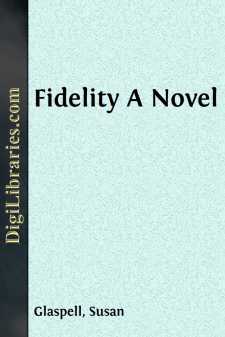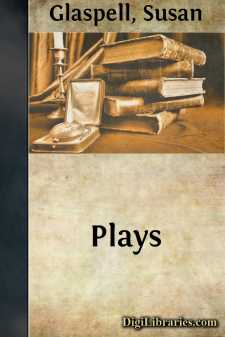Categories
- Antiques & Collectibles 13
- Architecture 36
- Art 48
- Bibles 22
- Biography & Autobiography 813
- Body, Mind & Spirit 142
- Business & Economics 28
- Children's Books 14
- Children's Fiction 11
- Computers 4
- Cooking 94
- Crafts & Hobbies 4
- Drama 346
- Education 46
- Family & Relationships 57
- Fiction 11828
- Games 19
- Gardening 17
- Health & Fitness 34
- History 1377
- House & Home 1
- Humor 147
- Juvenile Fiction 1873
- Juvenile Nonfiction 202
- Language Arts & Disciplines 88
- Law 16
- Literary Collections 686
- Literary Criticism 179
- Mathematics 13
- Medical 41
- Music 40
- Nature 179
- Non-Classifiable 1768
- Performing Arts 7
- Periodicals 1453
- Philosophy 64
- Photography 2
- Poetry 896
- Political Science 203
- Psychology 42
- Reference 154
- Religion 513
- Science 126
- Self-Help 84
- Social Science 81
- Sports & Recreation 34
- Study Aids 3
- Technology & Engineering 59
- Transportation 23
- Travel 463
- True Crime 29
Fidelity A Novel
by: Susan Glaspell
Description:
Excerpt
It was hard to get back into the easy current of everyday talk. Cora Albright's question had too rudely pulled them out of it, disturbing the quiet flow of inconsequential things. Even when they had recovered and were safely flowing along on the fact that the new hotel was to cost two hundred thousand dollars, after they had moved with apparent serenity to lamentation over a neighbor who was sick in bed and without a cook, it was as if they were making a display of the ease with which they could move on those commonplace things, as if thus to deny the consciousness of whirlpools near by.
So they seemed to Dr. Deane Franklin, who, secured by the shadow of the porch vine, could smile to himself at the way he saw through them. Though Deane Franklin's smile for seeing through people was not so much a smile as a queer little twist of the left side of his face, a screwing up of it that half shut one eye and pulled his mouth out of shape, the same twist that used to make people call him a homely youngster. He was thinking that Cora's question, or at any rate her manner in asking it, would itself have told that she had lived away from Freeport for a number of years. She did not know that they did not talk about Ruth Holland any more, that certainly they did not speak of her in the tone of everyday things.
And yet, looking at it in any but the Freeport way, it was the most natural thing in the world that Cora should have asked what she did. Mrs. Lawrence had asked if Mr. Holland—he was Ruth's father—was getting any better, and then Cora had turned to him with the inquiry: "Do you ever hear from Ruth?"
It was queer how it arrested them all. He saw Mrs. Lawrence's start and her quick look over to her daughter—now Edith Lawrence Blair, the Edith Lawrence who had been Ruth's dearest friend. It was Edith herself who had most interested him. She had been leaning to the far side of her big chair in order to escape the shaft of light from the porch lamp. But at Cora's question she made a quick turn that brought her directly into the light. It gave her startled face, so suddenly and sharply revealed, an unmasked aspect as she turned from Cora to him. And when he quietly answered: "Yes, I had a letter from Ruth this morning," her look of amazement, of sudden feeling, seemed for the instant caught there in the light. He got her quick look over to Amy—his bride, and then her conscious leaning back from the disclosing shaft into the shadow.
He himself had become suddenly conscious of Amy. They had been in California for their honeymoon, and had just returned to Freeport. Amy was not a Freeport girl, and was new to his old crowd, which the visit of Cora Albright was bringing together in various little reunions. She had been sitting over at the far side of the group, talking with Will Blair, Edith's husband. Now they too had stopped talking.
"She wanted to know about her father," he added.
No one said anything. That irritated him. It seemed that Edith or her mother, now that Cora had opened it up, might make some little attempt at the common decencies of such a situation, might ask if Ruth would come home if her father died, speak of her as if she were a human being.
Cora did not appear to get from their silence that she was violating Freeport custom. "Her mother died just about a year after Ruth—left, didn't she?" she pursued.
"About that," he tersely answered.
"Died of a broken heart," murmured Mrs. Lawrence.
"She died of pneumonia," was his retort, a little sharp for a young man to an older woman.
Her slight wordless murmur seemed to comment on his failure to see....






